Personalized Architectural Engineering tutoring — especially online — can quickly turn confusion into clarity, improving homework help, grades, and confidence.
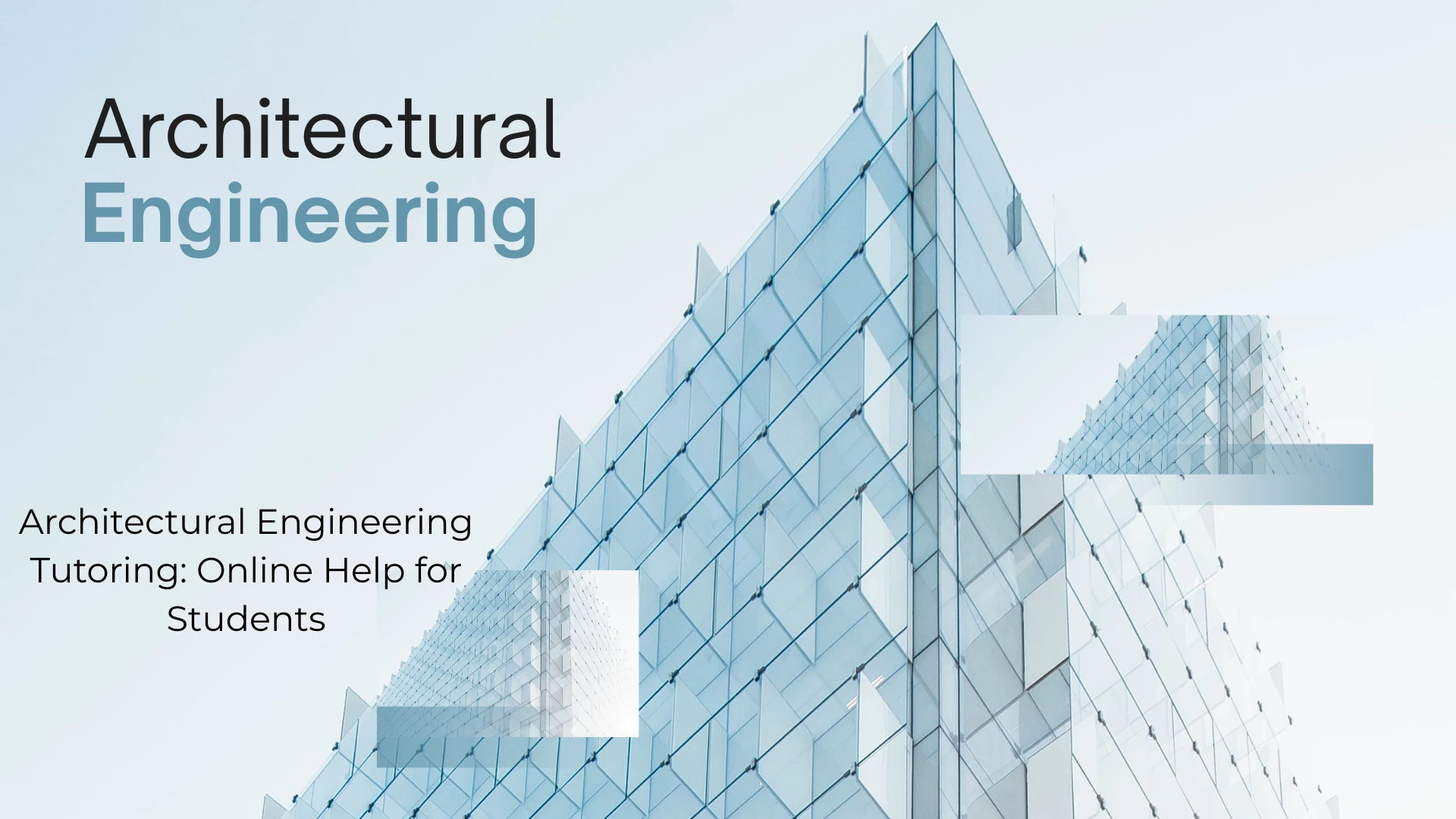
Understanding Architectural Engineering
Architectural engineering is a unique field where design meets technical building science. In this discipline, students learn how to engineer every part of a building – from its structure to its electrical, HVAC, and lighting systems. As Penn State explains, architectural engineers “apply practical and theoretical knowledge to the engineering design of buildings and building systems,” uniting expertise from structural, mechanical, electrical, lighting, acoustical and construction engineering. In short, an architectural engineering program covers a broad set of topics. This includes structural analysis and design, HVAC (mechanical systems), electrical systems, energy and sustainability, and even aspects of architecture such as drafting and 3D modeling. It’s a comprehensive curriculum that prepares students to create safe, efficient, and comfortable buildings.
To visualize how these diverse systems come together, let’s look at the core pillars of the discipline. The diagram below illustrates how structural, mechanical, and electrical elements must integrate seamlessly.
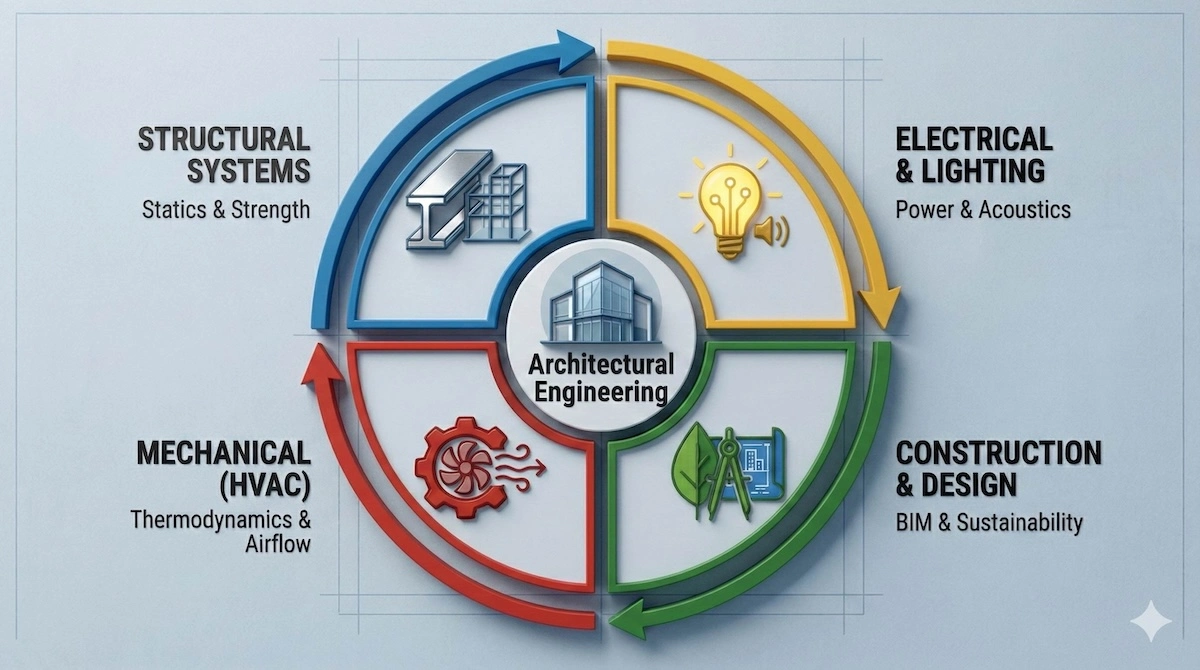
Architectural engineering combines structural, mechanical, and electrical systems into one cohesive design discipline.
Mastering the intersection of these four quadrants is exactly why students often seek extra help; it requires fluency in multiple engineering languages at once.
Why Architectural Engineering is Challenging
Because of this breadth, architectural engineering courses are demanding. Students often juggle advanced math and physics (for structural stability and materials), intensive software training (AutoCAD, Revit, MATLAB), and creative design projects all at once. For example, people spend about 86% of their time indoors, so architectural engineers must consider factors like indoor air quality, lighting, acoustics and occupant health – on top of strength and durability. This human- and environment-focused emphasis makes architectural engineering “the discipline with the highest potential to combat climate change”, but it also means majors pack in a lot of tough material. It’s no surprise that many students find topics like building science, structural design or fluid mechanics (for air flow) overwhelming at first. In a typical class, an instructor can only go so deep, so students who struggle often need extra, personalized help to keep up.
Benefits of Tutoring for Architectural Engineering Students
That’s where tutoring comes in. A dedicated architectural engineering tutor provides one-on-one coaching that targets a student’s specific needs. Tutors can break down complex problems step by step, help interpret assignment requirements, and explain concepts at the student’s pace. Studies show this kind of personalized attention makes a big difference. For instance, research has found that students in online tutoring programs saw significant gains in academic performance and confidence. Another analysis reported that one-on-one tutoring in subjects like math produced an effect size of 0.60 on achievement – a substantial improvement. In practice this translates to higher grades: in one survey 85% of parents said their child’s grades improved after receiving online tutoring. Plus, tutoring often boosts motivation and self-belief. When complex assignments or homework finally make sense, students gain confidence. In fact, many students report that working with a tutor helped them move from feeling “puzzled” to confident in just one session. These combined effects – better understanding, improved grades, and more confidence – are powerful benefits of extra help.
The impact of this personalized attention is not just anecdotal; it is backed by data. The statistics below highlight the measurable difference one-on-one coaching can make.
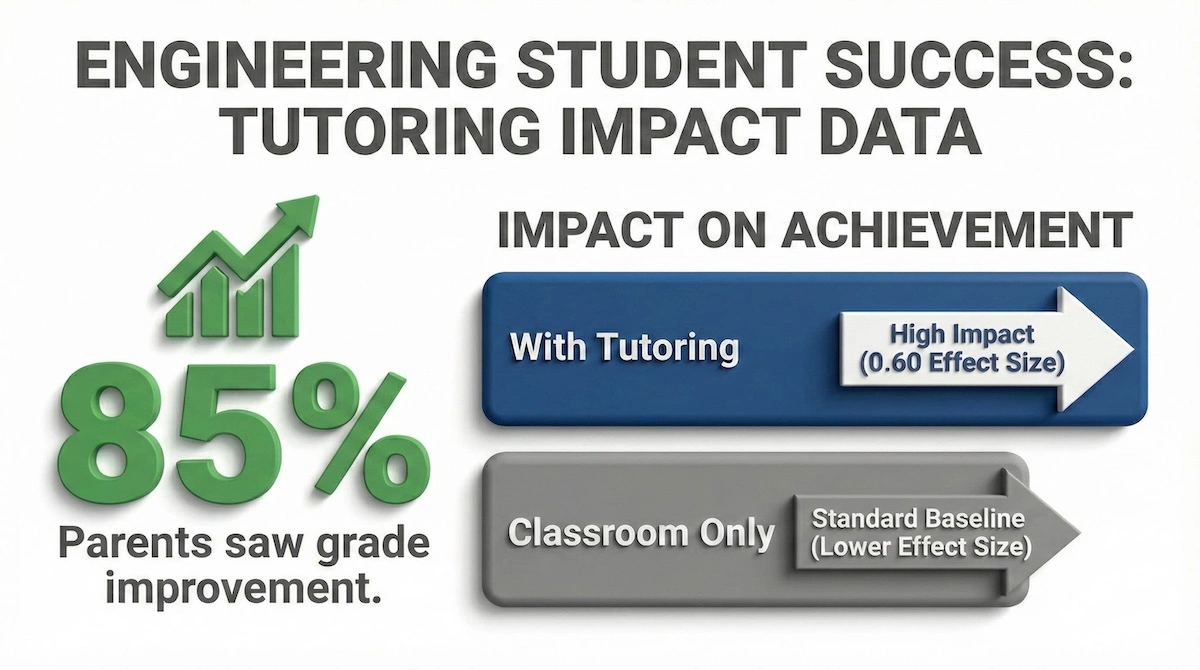
Studies show that 85% of students improve their grades with consistent, personalized tutoring support.
With an effect size of 0.60, personalized tutoring offers a significant performance advantage over relying solely on classroom lectures.
- Individualized Attention: Tutors give focused, one-on-one guidance on tricky topics (like statics, HVAC calculations, or CAD modeling). This tailored help ensures students truly grasp the material.
- Improved Performance: By targeting problem areas and providing extra practice, tutoring often leads to better exam and assignment scores. Studies report large learning gains for tutored students, reflecting how homework help can translate to higher grades.
- Boosted Confidence: When a tutor patiently answers questions and clarifies doubts, students feel less frustrated. As homework solutions become clear, students gain confidence in their abilities – an outcome echoed by many parent testimonials.
- Career and College Readiness: Tutors can share real-world insights and industry tips. Some programs even connect students with engineering professionals, helping students see how concepts apply on the job and expanding their professional network.
- Flexible Learning: Sessions can be scheduled around your life. Online tutoring lets you learn from home at a convenient time, whether you’re a busy college student or high school senior preparing for finals.
- Affordable Rates: Quality tutoring for engineering-level courses is often priced reasonably. For example, many college-level engineering tutors charge around $20–$40 per hour, and many services offer trial sessions or pay-as-you-go plans for flexibility.
Online Tutoring: A Growing Trend
In recent years, architectural engineering tutoring online has exploded in popularity. Global and U.S. market reports highlight a huge surge in demand. In the U.S. alone, the online private tutoring market was valued at about $4.32 billion in 2024, and is projected to reach $8.08 billion by 2030. Why the growth? Convenience and reach: online tutoring allows students anywhere (from California to the Gulf countries) to connect with expert tutors, not limited by geography. A market report notes that American students and parents increasingly prefer online sessions over in-person ones because of their “convenience, adaptability, and broader availability of qualified tutors”. In practical terms, this means a student can get help from the best architectural engineering tutor even if there’s no local specialist nearby – all through video chat or a virtual classroom. The post-COVID rise of remote learning has only accelerated this trend, making virtual tutoring a normal, effective option for students worldwide.
Another advantage of online help is the access to resources: during a session, a tutor can share digital models, drawings or simulations in real time. Plus, many platforms let students re-watch lesson recordings or review shared notes afterward, reinforcing learning. In short, online architectural engineering tutoring combines the benefits of personal tutoring with the flexibility of digital technology.
Choosing the Right Architectural Engineering Tutor
When selecting a tutor, quality matters. Look for someone with a strong background in architectural engineering (or related fields). Many parents prefer tutors who have a degree in engineering or architecture and experience teaching those subjects. Read reviews or ask for references – ideally, the tutor has helped other students succeed in AE courses. It’s also important that the tutor can explain concepts clearly: during your trial session, see if the explanations and teaching style match your learning needs. Don’t hesitate to ask whether they can assist with specific tools (like CAD software) or advanced topics relevant to your coursework.
It can help to use a structured approach to find help:
- Identify trouble spots: Figure out which AE topics you find hardest – e.g. structural analysis, energy modeling, or building codes. This helps you and any tutor focus on what really matters.
- Research options: Explore college tutoring centers, professional tutoring platforms, or peer tutors. Look for platforms that list tutor profiles and allow you to compare expertise and hourly rates (often around $20–$40).
- Read reviews and credentials: Check any testimonials or feedback. A good tutor will have students saying they clarify doubts and improve scores.
- Try a session: Many online tutoring services offer a short trial (sometimes free or at a low cost) so you can see if the tutor is a good match.
- Set a schedule: Once you find a tutor you like, plan regular sessions (even just 1–2 hours weekly). Consistency helps a lot.
- Prepare and participate: Before each session, have your questions and assignments ready. Active engagement – asking follow-up questions and practicing problems – will make tutoring most effective.
If you are ready to find support but aren’t sure where to start, follow this simple roadmap. This process ensures you find a mentor who matches your specific learning style.
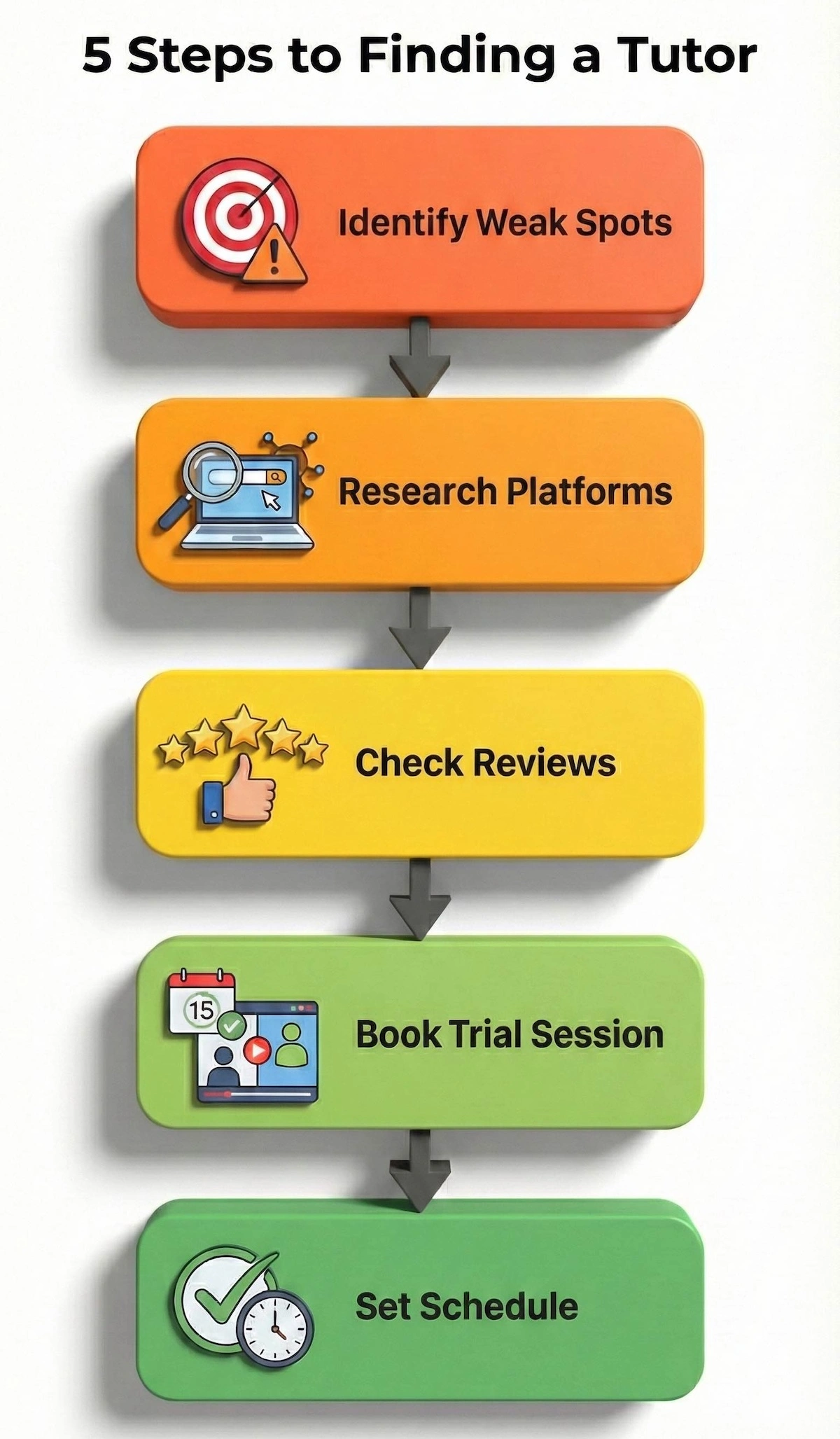
Follow these five simple steps to find a qualified tutor who matches your specific learning needs.
Following these five steps systematically will help you avoid low-quality services and connect with a tutor who can actually solve your specific problems.
Homework & Assignment Help
Tutoring isn’t just for exam prep – it also includes homework and assignment help. If you have a challenging architectural engineering project or lab, a tutor can guide you through each step without doing the work for you. For example, if you’re stuck calculating beam loads or drafting a design, the tutor will explain the method and check your work. This hands-on help ensures you actually learn the material. Importantly, tutors can often share extra resources like sample projects, study guides, or software tips (for tools like Revit or MATLAB) that go beyond what’s in textbooks. This practical support helps you complete assignments on time and deepens your understanding for future courses.
Many students report that having a tutor handle occasional “hw help” for them actually improves their independent skills. By reviewing each solution carefully with a tutor, students learn how to avoid similar mistakes on exams and projects. In essence, assignment help sessions double as focused study sessions that adapt to your pace – a benefit classroom teaching alone cannot always provide.
To understand why private instruction is often more efficient than self-study, compare the typical lecture hall experience directly with private tutoring.
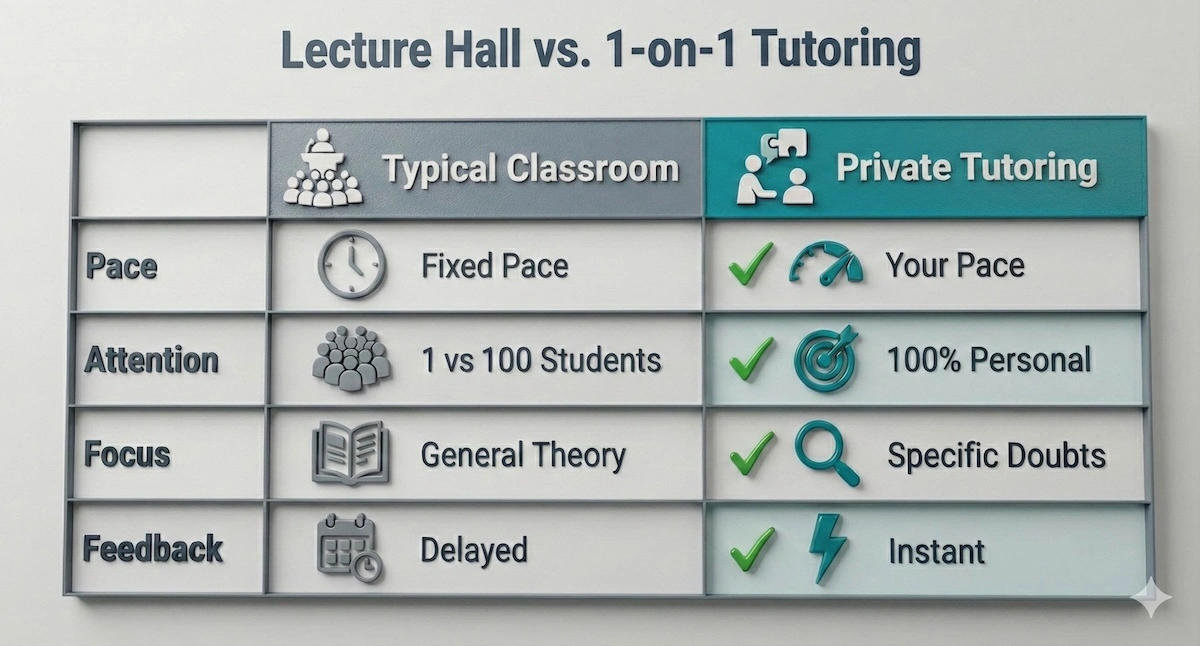
While classrooms teach general theory, private tutoring offers instant feedback and 100% personalized attention.
As shown above, the ability to move at your own pace and receive instant feedback is the primary driver of rapid student success.
Conclusion
Getting help with architectural engineering shouldn’t feel embarrassing – it’s a smart strategy. Whether it’s to catch up on a missed concept or to master a subject you find tough, a tutor can light the way. Tutoring provides that patient voice answering your “why” and “how” questions about building design and engineering math. As research shows, the impact can be dramatic: students in tutoring programs often see notable improvements in grades and confidence. By combining motivated students with expert architectural engineering teachers (in the form of tutors), tutoring bridges gaps between classroom lessons and understanding. And with online options, this help is just a click away – often at affordable rates around $20–$40 per hour. Ultimately, the goal of tutoring is simple: to help you learn better, do better, and feel better about your studies. If you or your student is struggling with homework or complex concepts, don’t hesitate to hire an architectural engineering tutor – the extra support can make all the difference.
Frequently Asked Questions
- Q: What does an architectural engineering tutor do? A: They provide one-on-one guidance on AE coursework – explaining concepts like structural design, HVAC systems, and CAD modeling step by step.
- Q: How do I find an architectural engineering tutor online? A: You can search tutoring platforms or academic forums for qualified AE tutors, check reviews, and often try a trial session before committing.
- Q: Can tutors help with architectural engineering homework and assignments? A: Yes, tutors can assist with homework, projects and assignments by clarifying steps, reviewing work, and teaching you to solve similar problems.
- Q: What are the benefits of online tutoring vs. in-person? A: Online tutoring offers the same personalized help from anywhere, with added convenience and a larger pool of qualified tutors available beyond your local area.
- Q: How much does architectural engineering tutoring cost? A: It varies by tutor and location, but many online AE tutors charge roughly $20–$40 per hour.
- Q: Is online tutoring effective for technical subjects like architectural engineering? A: Yes, studies show online tutoring can significantly improve learning outcomes even in technical STEM fields.
Related Subjects:
Architectural AutoCAD
Architectural Design Drafting & Drawing
Architectural History
Architectural Thesis
Architecture
Building Information Modeling (BIM)
Building Science
Construction Technology Management & Safety
Ekistics
Interior Design
Landscape architecture
Lighting Design
Lumion
Plumbing
Sustainable architecture
Transportation Planning
Urban Design and Planning
******************************
This article provides general educational guidance only. It is NOT official exam policy, professional academic advice, or guaranteed results. Always verify information with your school, official exam boards (College Board, Cambridge, IB), or qualified professionals before making decisions. Read Full Policies & Disclaimer , Contact Us To Report An Error

